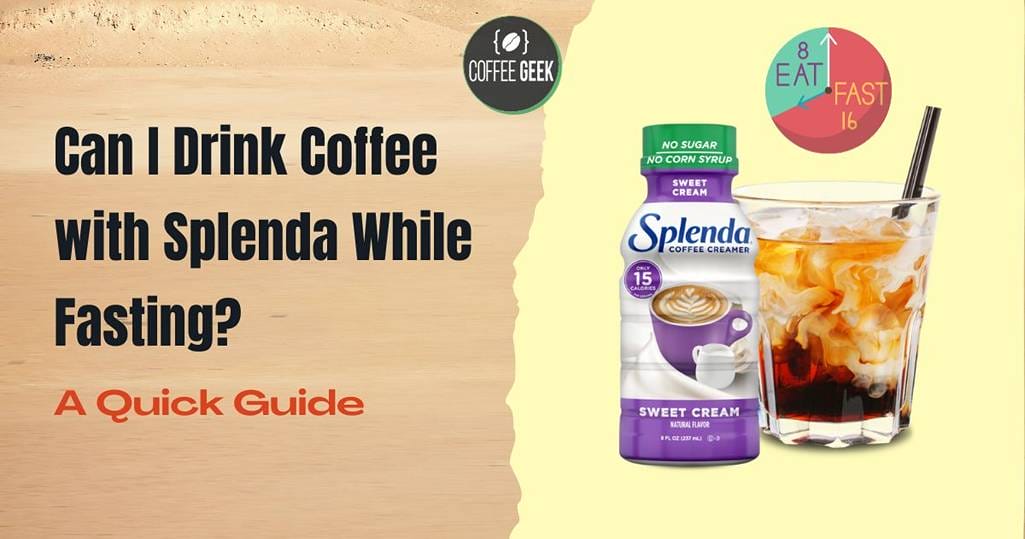Fasting has become increasingly popular for various reasons, ranging from weight loss to improving overall health.
One question that often arises is whether you can drink coffee with Splenda while fasting without breaking your fast.
Most people rely on a cup of coffee to kick-start their day and maintain a clear state of mind.
However, when you’re fasting, it’s crucial to understand the impact that certain additions, like Splenda, can have on your fasting goals. Can I drink coffee with Splenda while fasting?
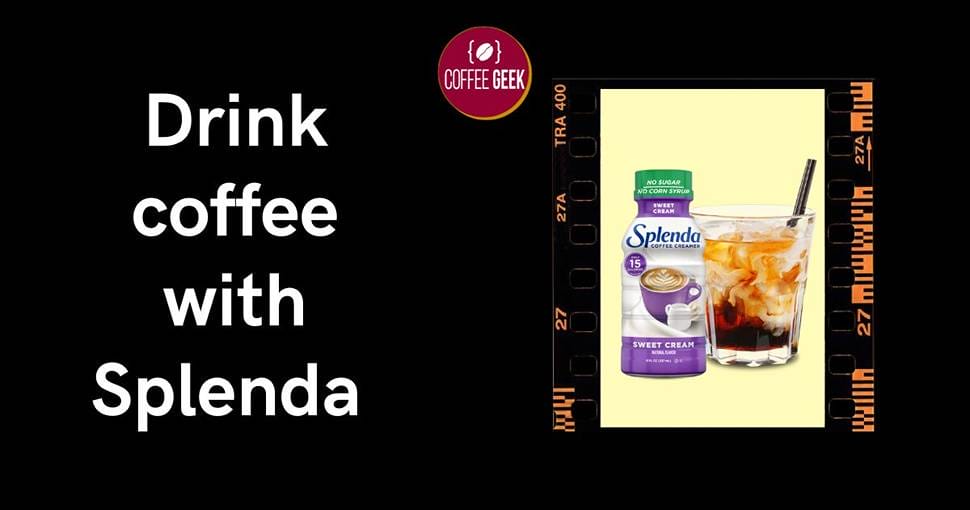
Splenda is a non-nutritive sweetener that does not provide any calories or carbohydrates, making it an appealing choice for those observing a fast.
You can drink coffee with Splenda while fasting as it generally does not break your fast.
However, it’s essential to consider the effects of coffee and sweeteners on blood sugar levels, caloric intake, and weight loss when determining whether this combination is suitable for your particular fasting plan.
Key Takeaways
Coffee with Splenda can be consumed while fasting as it doesn’t provide calories or carbohydrates
Consider the impact of sweeteners on blood sugar levels and weight loss when fasting
Keep in mind other factors, such as alternative sweeteners and dairy additions, for individual fasting goals
- Fasting and Coffee
- Can I Drink Coffee with Splenda While Fasting?
- Effects of Coffee and Sweeteners on Blood Sugar Levels
- Caloric Intake and Weight Loss. Is Black Coffee Keto?
- Alternatives to Splenda
- Adding Dairy and Creamers
- Coffee Beverages and Keto Diet
- Possible Systemic Effects of Coffee and Sweeteners
- Other Considerations During Fasting
- Practical Advice from Nutritionists
- Effects of Coffee on Overall Well-being
- Additional Recommendations
- Conclusion
- Frequently Asked Questions
Fasting and Coffee
When I’m fasting, especially during intermittent fasting, I often wonder if having coffee with Splenda will affect my fast.
Thankfully, I’ve found the answer and thought I’d share my experience with you all.
During my fasting window, I usually stick to water to stay hydrated. But sometimes, I crave that warm cup of coffee, especially in the morning.
So, I started to do some research and found out that black coffee is actually unlikely to hinder the benefits of intermittent fasting. Phew!
Black coffee has minimal calories and can even bolster the benefits of fasting due to its thermogenic effect, which increases metabolism.
This is particularly helpful when weight loss is one of my primary goals.
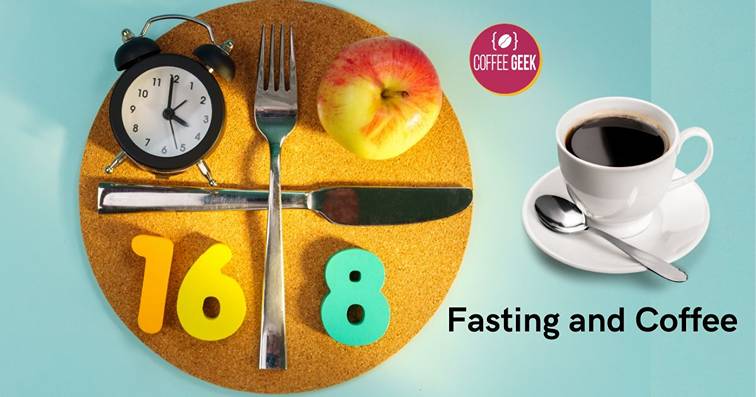
Now, what about adding Splenda to my coffee? I’m happy to report that I can safely drink coffee with Splenda while fasting.
Splenda is an artificial sweetener that doesn’t add any calories, and it helps me get my caffeine fix without breaking my fast. That’s a win-win for me!
However, it’s essential to remember that moderation is key. Drinking too much caffeine during a fast can potentially lead to dehydration or an upset stomach.
So, I make sure to keep my coffee intake in check while also drinking plenty of water.
In conclusion, for me, enjoying coffee with Splenda during fasting has been a pleasant and sustainable way to stick to my fasting regimen without sacrificing one of my favorite morning rituals.
Give it a try and see if it works for you too!
Can I Drink Coffee with Splenda While Fasting?
So, I’ve been wondering if adding Splenda to my coffee would affect my fasting.
Splenda is a popular artificial sweetener that replaces regular sugar in many products like baked goods or as a sweetener in coffee and tea.
It’s made from sucralose, which is actually derived from sugar but doesn’t contribute any calories to my diet.
Now, during a fast, I obviously want to avoid anything that might affect my blood sugar levels or spike my insulin.
The thing about Splenda is that it has a glycemic index of zero, which means it shouldn’t raise blood sugar levels.
However, some research suggests that consuming sucralose might affect blood sugar levels and elevate insulin levels.
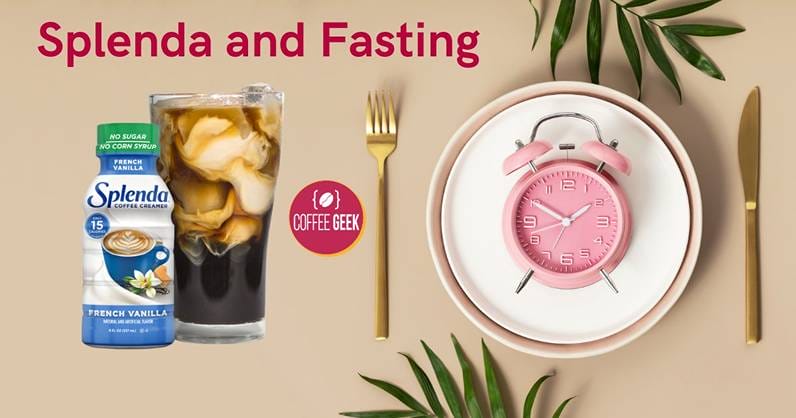
There’s a bit of a gray area when it comes to Splenda and fasting.
While I might not want to consume large amounts of it during my fast, having a small amount in my coffee probably wouldn’t be too detrimental.
In any case, it’s essential to keep in mind that everyone’s body is different, and our reactions to artificial sweeteners can vary.
Personally, I find that I can still enjoy my morning coffee with a bit of Splenda without breaking my fast.
If I’m uncertain or have specific health goals, it might be best to consult with a healthcare professional to be sure.
Fasting can be highly individual, and it’s vital to pay attention to how my body responds and adjust my habits accordingly.
Effects of Coffee and Sweeteners on Blood Sugar Levels
I’ve always been curious about how coffee and sweeteners affect blood sugar levels, especially while fasting.
When it comes to coffee, it seems that for most young, healthy adults, caffeine doesn’t have a significant impact on blood sugar.
Drinking up to 400 milligrams per day is considered safe, and some studies even suggest that both caffeinated and decaffeinated coffee might reduce the risk of developing type 2 diabetes.
However, when we add sweeteners to coffee, things get a bit more complicated.
Artificial sweeteners like Splenda, which contains sucralose, might not have an immediate effect on blood sugar or insulin.
But there’s some research suggesting that consuming artificial sweeteners could potentially raise blood sugar indirectly. Although more research is needed, it’s worth being cautious when using them.
One thing I’ve learned is that it’s essential to differentiate between various sweeteners.
For instance, Splenda might not have a significant impact on blood glucose or insulin, but other sweeteners, like sugar or high-sugar coffee beverages, can increase insulin resistance and negatively affect blood sugar levels.
In conclusion, while fasting, it’s essential to monitor how our body reacts to coffee and sweeteners, as different individuals might experience different impacts.
Coffee alone might not have a significant effect on blood sugar levels, but sweeteners like Splenda could potentially indirectly influence blood sugar.
Keeping an eye on my blood sugar levels when I drink coffee with Splenda is a good practice while fasting.
Caloric Intake and Weight Loss. Is Black Coffee Keto?
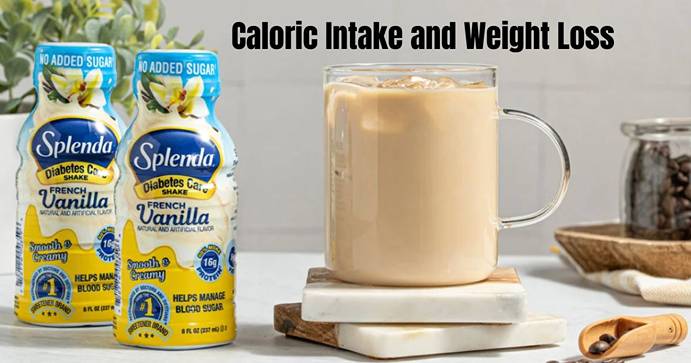
When I’m fasting, I often wonder if I can enjoy my coffee with Splenda. After all, I’ve heard that Splenda is a non-nutritive sweetener, meaning it does not provide any calories or carbohydrates.
Since maintaining a low caloric intake is essential during fasting, this seems to work in my favor.
However, it’s important to consider the impact of sweeteners on weight loss and fat reduction. You see, even though Splenda doesn’t have calories, it might still affect my appetite.
Artificial sweeteners can sometimes trick the brain into thinking you’ve consumed something sweet, which can lead to cravings and hinder my weight loss goals.
Now, when it comes to intermittent fasting, reduced caloric intake plays a huge role in experiencing the benefits like weight loss and fat reduction.
Essentially, when I fast, my body uses the stored fat for energy, and with fewer calories being consumed, it accelerates the rate at which fat is burned.
The primary benefit of fasting is that it helps me control my caloric intake and manage my weight. It means that I am consuming fewer calories, leading to a calorie deficit, which in turn promotes weight loss.
This may also prove beneficial in controlling my appetite and reducing the temptation to snack between meals.
Nevertheless, enjoying my coffee with Splenda while fasting seems like a reasonable choice given its lack of calories and carbohydrates.
I just need to be mindful of the potential impact on my appetite and cravings when indulging in artificially sweetened beverages.
So, while it may not necessarily be a bad idea, it’s always wise to keep an eye on how my body reacts to it.
Alternatives to Splenda
Now, if you’re like me and trying to find a sweet alternative to Splenda for your coffee while fasting, there are quite a few options out there.
Let me share some of the popular ones I’ve come across, so you can pick the one that suits you best.
Stevia is a popular natural sweetener derived from the stevia plant. It has no calories, making it a popular choice for people watching their weight. I’ve found that it tastes pretty good, and doesn’t raise blood sugar levels.
This makes it a great option if you want to keep your fast intact.
Moving on, I stumbled upon monk fruit sweetener, another natural, zero-calorie sweetener made from the monk fruit. It doesn’t cause blood sugar spikes either, so it’s another potential fasting-friendly option.
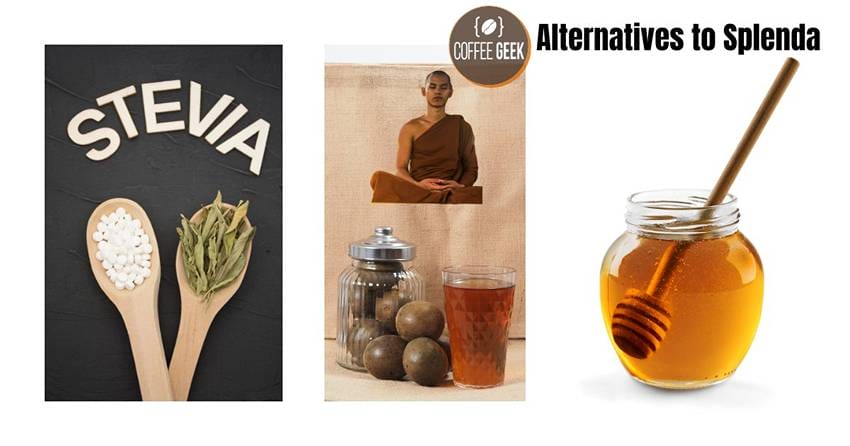
Unlike stevia, monk fruit sweetener has a unique, fruity taste that some people find really appealing.
Now, let’s talk about honey. Although honey is a natural sweetener, it’s not an ideal choice while fasting because it does have calories and could potentially break your fast.
If your ultimate goal isn’t strictly fasting but rather cutting back on artificial sweeteners, I would say honey is a better option than Splenda. But for fasting, you might want to skip it.
Equal is another popular sweetener you might consider trying. It’s made from aspartame and acesulfame potassium, both artificial sweeteners.
I find it delivers a taste quite similar to sugar. However, I need to warn you that Equal has a very small number of calories, and depending on your fasting goals, it might not be ideal either.
Stepping away from artificial sweeteners, maple syrup is also a possibility. Just like honey, maple syrup is a natural sweetener, but it contains calories.
Although it’s tasty and a healthier option than refined sugar, maple syrup shouldn’t be used while fasting.
In conclusion (oops, I mean), I hope I could help you find a sweet alternative to Splenda for your coffee.
Stevia and monk fruit sweetener are my go-to choices during fasting, but you’re free to choose whichever option feels right for you.
Remember, it’s all about finding what works best for your fasting journey.
Adding Dairy and Creamers
When it comes to adding dairy and creamers to my coffee while fasting, I’ve found that I need to be careful.
Milk, cream, and even some non-dairy creamers can contain calories, protein, and carbohydrates that might break my fast.
I usually avoid whole milk and non-fat milk, as both options contain lactose, a type of sugar that can add calories to my coffee.
The moderate protein diet content in milk can also potentially interfere with my fasting state.
Heavy cream, on the other hand, is lower in lactose and protein but higher in fat. While it might be a slightly better option, I still prefer to watch my intake.
When considering non-dairy creamers, I’ve realized that they can vary greatly in terms of ingredients and calorie content.
Some might be high in added sugars, while others might have artificial sweeteners that are suitable for fasting, like Splenda.
Keto coffee creamer? In summary, to keep my fast intact, I do my best to avoid adding dairy and creamers with calories and carbohydrates to my coffee.
If I really want to add something creamy, I opt for a small amount of heavy cream or a fasting-friendly non-dairy creamer. But, of course, my best choice is always to stick to plain black coffee.
Coffee Beverages and Keto Diet
As someone who loves a good cup of coffee, I’ve found that my usual blend of coffee with Splenda is something I need to adjust while fasting.
When it comes to keto coffee, the focus is on maintaining ketone levels to keep your body in a state of ketosis. This means any additives that may affect ketone levels and breakfasting should be avoided.
Now, you might wonder about Splenda.
While it is a commonly used sugar substitute, there are concerns that it may break your fast. It’s best to tread carefully and try to go for a simpler coffee setup during your fasting period.
With keto in mind, I’ve discovered some fantastic coffee alternatives that help me maintain my ketone levels and fasting state. One popular option is to add a tablespoon of coconut oil to your black coffee.
Coconut oil is high in medium-chain triglycerides (MCTs), which are known to increase ketone production and provide an immediate source of energy.
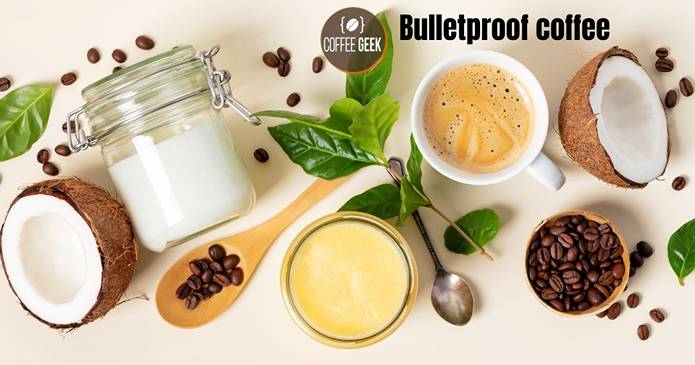
Another great addition to your coffee is butter, specifically grass-fed butter.
Combining grass-fed butter with coconut oil in your coffee results in a creamy and delicious beverage commonly known as “bulletproof coffee.”
The healthy fats in this concoction help stabilize hunger levels and fuel your body throughout the fasting period.
In conclusion, while my usual coffee with Splenda isn’t the ideal choice during fasting, there are plenty of keto coffee options to explore that provide energy and support ketosis.
By making simple adjustments, you can still enjoy your daily cup without compromising your fasting goals.
So, why not brew up a delicious cup of keto coffee and continue reaping the benefits of your fasting journey!
Possible Systemic Effects of Coffee and Sweeteners
When I started my fasting journey, I was curious about whether it’s okay to drink coffee with Splenda during my fasting periods.
After doing some research, I learned that there are a few systemic effects that coffee and sweeteners can have on our bodies. Let me share my findings with you.
First, drinking coffee can actually boost our metabolism, thanks to its caffeine content. Caffeine is a known stimulant, and it can help increase our metabolic rate by up to 11%.
This means that we might burn more calories throughout the day if we drink coffee. However, it’s important to note that this effect might decrease if we consume caffeine regularly, as our bodies can develop a tolerance to it.
Another aspect to consider is inflammation.
While some research suggests that moderate coffee consumption can have anti-inflammatory effects, other studies imply that excessive caffeine intake might increase inflammation in the body.
So, it’s wise to be mindful of how much coffee we’re drinking during fasting periods.
When it comes to sweeteners like Splenda, things get a bit more complicated. Some studies have found that non-nutritive sweeteners, including Splenda, can have a positive impact on blood sugar levels and weight management.
However, other findings suggest that these sweeteners might not be as harmless as we might think, particularly during fasting.
Researchers have discovered that artificial sweeteners can influence insulin release, which could potentially affect our fasting results.
Additionally, some studies have linked sweetener consumption to an increased risk of type 2 diabetes and heart disease. But of course, more research is needed to confirm these associations.
As for drinking coffee with Splenda while fasting, it might be helpful to experiment and see how our bodies react.
Some people might experience no negative effects, while others could find that their fasting results, blood sugar levels, or inflammation markers are affected.
In my case, I realized that my body manages well with black coffee without any sweeteners during fasting, but as always, it’s essential to listen to our bodies and pay attention to any changes we may experience during fasting periods.
| Aspect | Can I drink coffee with Splenda while fasting? |
|---|---|
| Caloric Content | Splenda (Sucralose) is considered non-caloric. However, it might have a negligible amount of calories due to fillers in some products. Check the specific product label for accurate information. |
| Impact on Insulin | Splenda is generally considered to have minimal impact on insulin levels, making it suitable for those fasting. |
| Taste Preferences | Some people find that artificial sweeteners, including Splenda, alter the taste of coffee. Personal preference varies. |
| Fasting Goals | If fasting for autophagy or metabolic benefits, plain black coffee is often recommended to avoid any potential insulin response. |
| Research Findings | Limited research suggests that artificial sweeteners may not significantly impact fasting-related benefits, but individual responses may vary. |
| Consultation with Experts | Consult with a healthcare professional or a nutritionist for personalized advice based on individual health conditions. |
| Alternatives | If concerned about the impact of artificial sweeteners, consider alternatives like stevia or monk fruit, which are natural sweeteners. |
| Hydration | Coffee with Splenda can contribute to overall hydration during fasting, but water remains the best choice for hydration. |
Other Considerations During Fasting
In addition to wondering whether I can drink coffee with Splenda while fasting, there are some other points I consider during the fasting window.
It’s usually not just about Splenda; there are other beverages, ingredients, and health-related aspects to be mindful of while sticking to the fasting routine.
For example, I’m cautious about consuming other beverages like teas and diet sodas as well.
During the fasting window, anything that contains carbohydrates can potentially break my fast, so I always double-check the nutritional information and keep my intake to calorie-free or extremely low-calorie options.
When it comes to adding flavors to my beverages, I like to use cinnamon. It’s a natural spice and can improve the taste of coffee or tea without providing significant calories or carbohydrates.
Plus, cinnamon is known to have some health benefits, such as helping regulate blood sugar and reduce inflammation.
As I fast, I try to engage in the process of autophagy, where my body naturally recycles and cleanses cellular components.
Autophagy is one of the main benefits of intermittent fasting, so I avoid consuming anything that might inhibit this cellular process.
For instance, some artificial sweeteners might negatively impact autophagy, so it’s crucial to remain aware of what I’m including in my drinks or meals.
Another consideration during fasting is my blood pressure. Fasting is generally believed to promote better blood pressure regulation.
However, it’s essential to monitor the caffeine intake from coffee, as it can temporarily elevate blood pressure in certain individuals. Always listen to my body and adjust caffeine consumption accordingly.
Practical Advice from Nutritionists
As a health enthusiast, I’ve always been curious about how certain ingredients like Splenda affect my fasting routine. So, I decided to dig deeper and consult some nutritionists to gather practical advice.
Firstly, it’s essential to check the nutrition label on the Splenda packet.
The FDA-approved sweetener contains a minimal amount of calories and carbohydrates, which may or may not break a fast, depending on individual goals and fasting methods.
I learned that consuming black coffee during fasting is generally accepted, as it increases metabolism, supports energy levels, and provides antioxidants.
However, adding Splenda might be a personal choice.
Some nutritionists suggest that it’s better to avoid any sweeteners during fasting, while others claim that a minimal amount of Splenda should not affect the fasting benefits significantly.
Moreover, I also found that sticking to the basics and keeping my coffee black can be helpful in maintaining my fasting regimen.
If the taste of black coffee isn’t appealing, I might opt for alternatives, such as herbal tea or lemon-infused water, to help keep hunger pangs at bay.
In conclusion, it’s essential to consider individual goals and fasting methods while making such decisions.
Effects of Coffee on Overall Well-being
I’ve always been curious about how coffee affects my well-being, especially when I consider adding something like Splenda to it during fasting periods.
So, I did a little research and found out a few interesting things that can help us all understand the impact of coffee on our health.
First off, let’s talk about the beans. High-quality coffee beans can actually provide us with various health benefits. Those antioxidants we often hear about?
Yeah, coffee has them in abundance. It also has essential nutrients like vitamins B2, B3, and B5, manganese, and potassium.
Just remember, not all beans are created equal, so be mindful when choosing which ones to brew.
Now, what about flavored coffee? Well, while they may taste delicious, many of the added flavorings come with extra sugars and artificial ingredients that may not be so great for our health.
It’s especially important to be cautious with flavored coffee during fasting.
As for dehydration and hydration, it turns out that coffee won’t necessarily cause dehydration in moderate amounts.
Although it has a diuretic effect that can make us pee more, it won’t lead to an imbalance in our overall hydration levels when consumed in reasonable amounts.
However, drinking excessive amounts, especially in hot weather, may lead to dehydration if I’m not compensating with plenty of water.
When it comes to chronic conditions, coffee has some unexpected benefits.
It turns out that it may help protect our liver and lower our risk of some cancers, cardiovascular diseases, and even neurological diseases like Parkinson’s and Alzheimer’s.
Of course, it’s essential to always consult with a healthcare professional before relying on coffee to manage any chronic condition.
Lastly, let’s address the Splenda in the room.
Artificial sweeteners like sucralose (found in Splenda) may be a helpful alternative to sugar for some people during fasting, as it’s a low-calorie option that can satisfy a sweet tooth without breaking the rules.
However, it’s important to note that some studies have raised concerns over potential side effects, so moderation is key.
All in all, my research has helped me gain a clearer understanding of how coffee and its various components can affect my overall well-being, even during fasting periods.
It’s essential to always consider our individual needs and preferences to make the right choice for our health.
Additional Recommendations
In my journey with intermittent fasting, I’ve explored other options besides coffee with Splenda, especially when I want to avoid artificial sweeteners.
I found that herbal teas are a fantastic alternative, as they have a calming effect and come in a variety of flavors. Moreover, they’re calorie-free and won’t affect your fast.
I noticed that added sugars should be avoided during fasting, as they can potentially break the fast and lead to weight gain.
It’s better to get used to the natural flavor of your drinks or try natural sweeteners like stevia. And remember, moderation is key!
When drinking coffee while fasting, I sometimes experienced nausea and heartburn. To avoid this, I learned that it’s wise to start with a small amount of coffee and gradually increase it if your stomach can handle it.
Slowly sipping on your coffee can also help lessen these side effects.
Lastly, I discovered that it’s crucial to stay well-hydrated with water through the fasting period. It not only helps with digestion but also makes coping with the fast easier and more comfortable.
So, don’t shy away from experimenting with various drinks during your intermittent fasting journey – I found that it just takes a bit of trial and error to figure out what works best for me!
Conclusion
Black coffee is often considered an easy and delicious solution for many keto dieters looking to lose weight without compromising their dietary regimen.
The fundamental principle of a keto diet is to stimulate the body to burn fat for energy by eating a high-fat, moderate-protein, and very low-carbohydrate diet.
Since plain black coffee is naturally low in calories and contains very few carbs, if any, it is generally keto-friendly and does not hinder the body’s process of burning fat for energy.
Frequently Asked Questions
Can artificial sweeteners in tea affect intermittent fasting?
From my experience, using artificial sweeteners like Splenda in tea shouldn’t affect intermittent fasting. That’s because Splenda contains zero calories and doesn’t trigger an insulin response.
So, it’s generally safe to enjoy tea with artificial sweeteners during a fasting period.
Does Splenda in coffee break a fast during blood work?
Now, this is a more specific case. While Splenda might not interfere with intermittent fasting, using it in coffee for blood work could be a different story.
I’d recommend sticking to plain water and avoiding coffee with any sweeteners before having blood work done.
Is it okay to use stevia in coffee while fasting?
Stevia is considered a fasting-friendly sweetener because it also contains zero calories and doesn’t spike blood sugar levels. So, I would say it’s okay to use stevia in coffee during fasting, similar to Splenda.
Does Splenda impact intermittent fasting?
In my understanding, Splenda shouldn’t impact intermittent fasting since it doesn’t contain calories or cause an insulin response.
It’s safe to consume products containing Splenda while fasting, as long as they don’t contain other ingredients that might break your fast.
Can sweeteners be used in coffee during a fast?
Yes, fasting-friendly sweeteners like Splenda and stevia can be used in coffee during a fast. Just make sure the sweetener you choose has zero calories and doesn’t trigger an insulin response.
What fasting-friendly sweeteners can be used in coffee?
Fasting-friendly sweeteners for coffee include Splenda (sucralose) and stevia, both of which have no calories and don’t spike blood sugar levels.
You can feel free to add these sweeteners to your coffee while fasting without worrying about breaking your fast.

